第七部分 正说反译,反说正译
- 格式:doc
- 大小:45.00 KB
- 文档页数:4
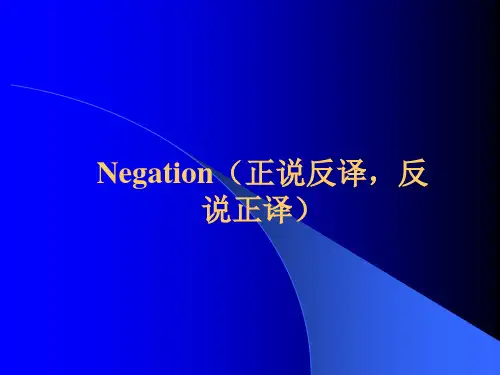
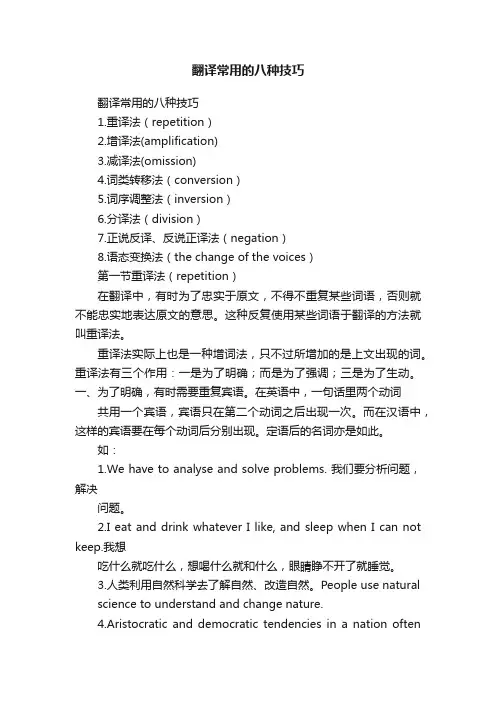
翻译常用的八种技巧翻译常用的八种技巧1.重译法(repetition)2.增译法(amplification)3.减译法(omission)4.词类转移法(conversion)5.词序调整法(inversion)6.分译法(division)7.正说反译、反说正译法(negation)8.语态变换法(the change of the voices)第一节重译法(repetition)在翻译中,有时为了忠实于原文,不得不重复某些词语,否则就不能忠实地表达原文的意思。
这种反复使用某些词语于翻译的方法就叫重译法。
重译法实际上也是一种增词法,只不过所增加的是上文出现的词。
重译法有三个作用:一是为了明确;而是为了强调;三是为了生动。
一、为了明确,有时需要重复宾语。
在英语中,一句话里两个动词共用一个宾语,宾语只在第二个动词之后出现一次。
而在汉语中,这样的宾语要在每个动词后分别出现。
定语后的名词亦是如此。
如:1.We have to analyse and solve problems. 我们要分析问题,解决问题。
2.I eat and drink whatever I like, and sleep when I can not keep.我想吃什么就吃什么,想喝什么就和什么,眼睛睁不开了就睡觉。
3.人类利用自然科学去了解自然、改造自然。
People use naturalscience to understand and change nature.4.Aristocratic and democratic tendencies in a nation oftenshowthemselves in its speech.民族的贵族倾向和民族倾向常在其言语中表现出来。
5.我们来修改安全规则和卫生规则吧。
Let’s revise our safety andsanitary regulations.二、英语常用省略,但为了明确,也为了强调某些内容,在汉语中常常要将省去的部分重译出来。
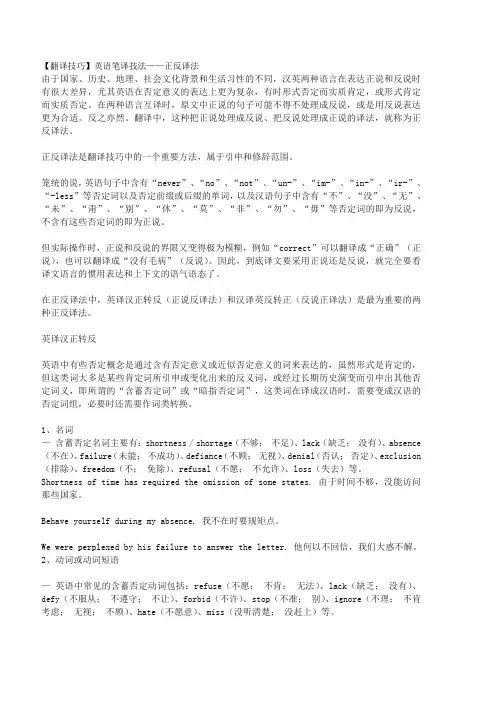
【翻译技巧】英语笔译技法——正反译法由于国家、历史、地理、社会文化背景和生活习性的不同,汉英两种语言在表达正说和反说时有很大差异,尤其英语在否定意义的表达上更为复杂,有时形式否定而实质肯定,或形式肯定而实质否定。
在两种语言互译时,原文中正说的句子可能不得不处理成反说,或是用反说表达更为合适。
反之亦然。
翻译中,这种把正说处理成反说、把反说处理成正说的译法,就称为正反译法。
正反译法是翻译技巧中的一个重要方法,属于引申和修辞范围。
笼统的说,英语句子中含有“never”、“no”、“not”、“un-”、“im-”、“in-”、“ir-”、“-less”等否定词以及否定前缀或后缀的单词,以及汉语句子中含有“不”、“没”、“无”、“未”、“甭”、“别”、“休”、“莫”、“非”、“勿”、“毋”等否定词的即为反说,不含有这些否定词的即为正说。
但实际操作时,正说和反说的界限又变得极为模糊,例如“correct”可以翻译成“正确”(正说),也可以翻译成“没有毛病”(反说)。
因此,到底译文要采用正说还是反说,就完全要看译文语言的惯用表达和上下文的语气语态了。
在正反译法中,英译汉正转反(正说反译法)和汉译英反转正(反说正译法)是最为重要的两种正反译法。
英译汉正转反英语中有些否定概念是通过含有否定意义或近似否定意义的词来表达的,虽然形式是肯定的,但这类词大多是某些肯定词所引申或变化出来的反义词,或经过长期历史演变而引申出其他否定词义,即所谓的“含蓄否定词”或“暗指否定词”,这类词在译成汉语时,需要变成汉语的否定词组,必要时还需要作词类转换。
1、名词—含蓄否定名词主要有:shortness / shortage(不够;不足)、lack(缺乏;没有)、absence (不在)、failure(未能;不成功)、defiance(不顾;无视)、denial(否认;否定)、exclusion (排除)、freedom(不;免除)、refusal(不愿;不允许)、loss(失去)等。
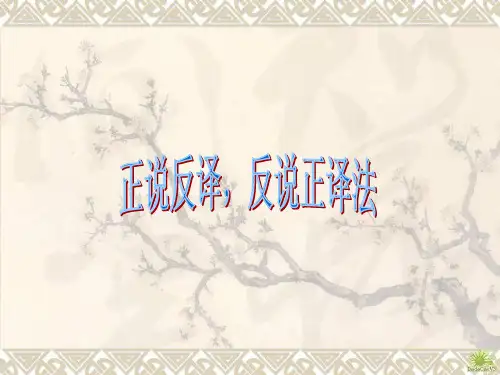


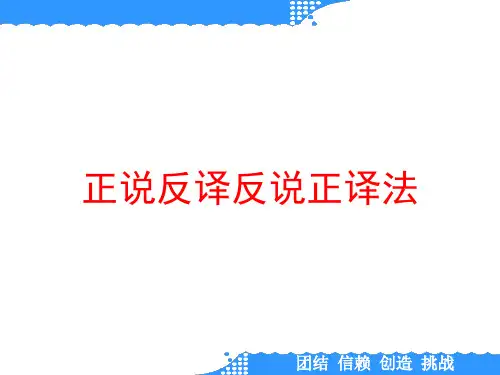


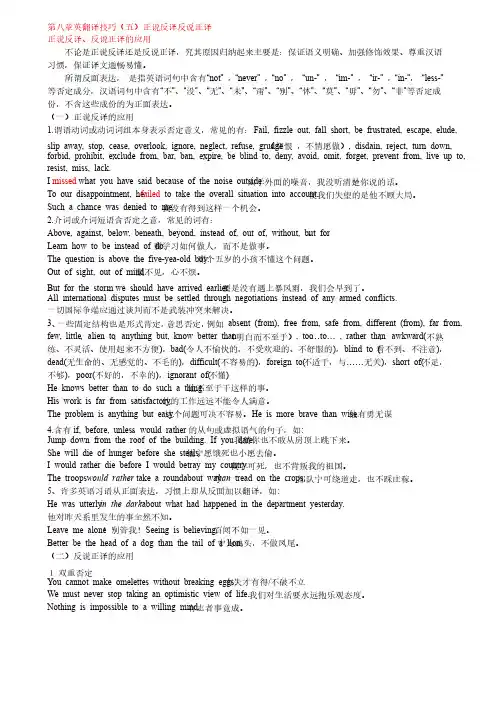
第八章英翻译技巧(五)正说反译反说正译正说反译、反说正译的应用不论是正说反译还是反说正译,究其原因归纳起来主要是:保证语义明确、加强修饰效果、尊重汉语习惯,保证译文通畅易懂。
所谓反面表达,是指英语词句中含有“not”,“never”,“no”,“un-”,“im-”,“ir-”,“in-”,“less-”等否定成分,汉语词句中含有“不”、“没”、“无”、“未”、“甭”、“别”、“休”、“莫”、“毋”、“勿”、“非”等否定成份,不含这些成份的为正面表达。
(一)正说反译的应用1.谓语动词或动词词组本身表示否定意义,常见的有:Fail, fizzle out, fall short, be frustrated, escape, elude, slip away, stop, cease, overlook, ignore, neglect, refuse, grudge(怨恨,不情愿做), disdain, reject, turn down, forbid, prohibit, exclude from, bar, ban, expire, be blind to, deny, avoid, omit, forget, prevent from, live up to, resist, miss, lack. I missed what you have said because of the noise outside.由于外面的噪音,我没听清楚你说的话。
To our disappointment, he failed to take the overall situation into account. 使我们失望的是他不顾大局。
Such a chance was denied to me.我没有得到这样一个机会。
2.介词或介词短语含否定之意,常见的词有:Above, against, below, beneath, beyond, instead of, out of, without, but for。

74英汉翻译中的正说反译和反说正译的探讨岳淑珍( 辽宁对外经贸学院,辽宁 大连 116052 )【摘 要】本文通过对英语句子的翻译,简要论述了英语翻译中的正说反译法和反说正译法。
英语否定结构的翻译是英汉翻译中的一个重点,也是难点。
本文作者按照词性进行分类,论述了各种正译与反译的翻译方法,为高校非英语专业的英语教师及参加四六级考试的学生,提供了切实可行的翻译技巧。
【关键词】否定;正说;反译;反说;正译由于社会文化背景不同,人们的思维方式有很大的差异。
这种差别体现在语言习惯上,就产生了语言各自独特的表达形式。
英汉两种语言在表达否定意义时,这种差异尤为突出。
英语与汉语都可以从正面或者反面来表达同一概念。
在翻译过程中,有些从正面表达的语句可以处理成反面表达,也可以把反面表达的内容处理成正面表达。
这种把正说处理成反说的译法被称作“反译”,把反说处理成正说的译法被称作“正译”。
有时候语言的正反表达形式不能对译,必须进行正反转换,以保证译文的流畅和通顺。
一、正说反译有些英语句子在形式和内容上虽然都是肯定的,但有时需要根据汉语表达习惯及修辞或语气的要求译成否定形式,才能更好地表达原文内容。
翻译以下词汇和短语时可运用正说反译的方法。
1.正说反译 — 动词miss(错过),deny(否认,剥夺),fail(不及格,未成功),lack (缺乏),ignore (不顾,不理),neglect(忽视),overlook(不注意), exclude(排除),refrain from(克制), refuse(拒绝),lose(丧失)1)I missed what you have said because of the noise outside.由于外面的噪音,我没听清楚你说的话。
2)She’s still feeling pretty low about failing that exam.由于没有通过那次考试,她的情绪仍然低落。
正说反译与反说正译英语和汉语有相同之处,那就是在表达同一事物或同一概念时,往往可以从正面叙述,也可以从反面叙述。
比如我们可以说“很困难”(quite difficult),也可以改成“很不容易”(far from easy);说做某事“竭尽全力”(do one’s best),也可以说“不遗余力”(spare no effect);可以说某个学生成绩“还好”(good),也可以说“不错”(not bad)。
但由于思维方式的不同,英语中有些从正面表达的东西在汉语中习惯从反面表达;而有些从反面来表达的东西在汉语中则习惯从正面来表达。
因此,英译汉时常常有必要进行转换。
这就是通常所说的“正说反译与反说正译”法。
如英语中的“wet Paint!”,汉语中常说成“油漆未干”,英语中说“I won’t keep you waiting long ”汉语中却说“我一会而就回来。
”1、正说反译:Miss the bus没有赶上车Live up to the expectations of my parent不辜负父母的期望Be absent from the meeting没有出席会议A final decision不可更改的决定Frost-free refrigerator无霜冰箱Freeze别动Mortally ill不治之症The window refuses to open窗户打不开The explanation is pretty thin这个解释站不住脚Beauty is but skin deep.美丽但不肤浅。
Opportunity knocks but once.机会只来一次。
Keep upright切勿倒置。
Agreeable sweetness甜而不腻。
I doubt it我不相信。
Mind your steep当心脚下。
2、反说正译:The specification lacks detail.说明书不够详细。
翻译就这七个字翻译技巧可以概括为七个字:“分”、“合”、“加”、“减”、“转”、“调”和“反”。
简称“七字诀”。
1). Division 分句法2). Merge 合句法3) Amplification 增译法增词法4) Omission 减译法省略法5) Conversion 词类转换法转换6).Inversion 词序调整法位置调整7).Negation 正说反译,反说正译可以这样理解:1.分译4=2+2 一分为二2.合译2+2=4 合二为一3.加词2+2=2 加词不加意4.减词2-2=2 减词不减意5.转换2+2=3+1 变换符号不变换意思6.调整1+2=2+1 前后移位7. 反译1+2=-(-1-2)反着译一. 所谓“分”即为“分译”。
又称为:“分句法”,是指把原文中的一个词或一个短语扩展成一个句子。
这个词或短语虽然从语法上分析只说明某句子成分。
但从逻辑意义上看说明整个句子,起着相当于一个并列分句或者一个状语从句的作用。
例如:The Chinese seemed justifiable proud of their economic achievements.中国人似乎为他们在经济上的成就而自豪,这是合乎情理的。
Y ou will soon be amply rewarded for your help.你将很快获得重奖,因为你乐于助人。
But another round of war in the region clearly would put strains on the international relations.但是,如果该地区再次发生战争,国际关系显然会紧张起来。
A gang of men, under the direction of their energetic and likeable foreman, 25-year-old Phineas P. Gage, was working on a new line of the Rutland and Burlington railroad.一伙工人正跟着他们的领班在拉特兰-伯灵顿铁路的新线路上干活。
汉译英翻译技巧一、分清主从(Subordination)汉语句中各分句关系比较松散,所以在动笔前应认真分析句子要旨所在。
句中重点往往在后。
英译时,要突出重点或主句,其他部分可分别用介词短语,非谓语动词形式或各种从句表示。
1、没有农业,人们就不能生存,社会生产就不能继续下去。
Without agriculture, people cannot exist, neither can social productionproceed.2、他们一听到“反霸”就火冒三丈,这充分暴露了他们那霸权主义的蛮横嘴脸。
The fact that they fly into a rage at a mere mention of the expression“anti-hegemony”is enough to reveal their true colours as a domineering hegemonists.3、有人以为社会主义就了不起,一点缺点也没有,哪有这个事?Some believe that socialism is just perfect, without a single flaw. How canthat be true?4、但是,象我们常说的那样,道路总是曲折的,前途总是光明的。
But as we have often said, while the road ahead is tortuous, the future isbright.二、选词用字(Diction)在汉译英时应特别注意选找与原文中在意义上和风味上尽可能都类似的词语。
1、每个民族都有它的长处,不然它为什么能存在?为什么能发展?Every nation has its own strong points. If not, how can it survive? How can it progress?2、树雄心,立壮志,向科学技术现代化进军。
第七部分正说反译,反说正译英译汉1.It is wiser than to believe what you call money talks。
我不至于蠢到相信你说的金钱万能呢。
2.He could do anything he was asked to do but return to his old life.叫他干什么他都愿意,只要不让他再过从前的日子。
3.All graduates from Foreign Language Institutes will not be appointed to do translation work.外院的学生并非都被分配去做翻译工作。
4.Africa is not kicking out western imperialism in order to invite other new master.非洲踢出西方帝国主义,不是为了请进新的主人。
5.Both sides thought that the peace proposal was one they could accept with dignity.双方都认为开会不失体面地接受这样的和平方案。
6.One could not be too careful in a new neighborhood.新到一个陌生的邻里,越小心越好。
7.Nothing is so beautiful but it betrays some defect on close inspection.再漂亮的东西,只要仔细观察,也会发现某种缺陷。
8.The moon is a world that is completely and utterly dead, a sterile mountainous waste.月球上北京一个毫无生机的世界,是多山的不毛之地。
9.All the chemical energy of the fuel is not converted into heat.燃料中的所有化学能并不都转化为热能。
10.All these various losses, great as they are, do not in any way contradict the law of conservation of energy.所有这些损失,尽管很大,却都没有违反能量守恒定律。
11.All other sources of heat besides the sun would not raise the temperature of the earth 1/4 degree F.除了太阳以外,所有其他能源都不能把地球的温度升高华氏1/4度。
12.The contemporary phenomenon of motorcar worship is to be explained not least by the sense of independence and freedom that ownership entails.崇拜汽车的这种现代现象在很大程度上要从与所有权相伴的独立和自由的意识上来解释。
13.And this failure to recognize and analyze the interrelationship of linguistic and non-linguistic problems produces two major signs of ineffectiveness.你没能够意识到和分析出语言和非语言之间的内部联系,才产生了这两种效率低下的现象。
14.Not all sounds made by animals serve as language, and we have only to turn to that extraordinary discovery of echolocation in bat to see a case in which the voice plays a strictly utilitarian role.动物发出的声音并不都气语言作用,我们只需要以蝙蝠的固定声位的发现为例,通过这个不同寻常的事例,我们就能知道声音起着非常实际的作用。
15.Because of the possibility of human error and total reliance on communications between pilots and controller the system will be “fail-dangerous” rather than “fail-safe.”。
由于人难免犯错,以及完全依赖飞行员与控制器之间的联系,这一套方法与其说会自动防止故障,倒不如说会自动发造成危险。
16.I know it is a square peg in a round hole; still, it serves after a fashion.我知道此物方枘圆凿,十分不配,但尽管如此,还是勉强顶用。
17.One may as well be asleep to read for anything but to improve his mind and morals, and regulate his conduct.读书若不是为了培养才德端庄品性,还不如睡大觉好。
18.Few things are impossible in themselves: and it is often for want of will, rather than of means, that men fail of success.事情很少有做不成的,之所以做不成,与其说条件不够,不如说缺乏决心。
19.It is not our view that the substance the tone of his remarks this morning will contribute to creating a lasting peace in the Middle East.我们认为他今天上午讲话的内容和语气将无助于中东地区持久和平的建立。
20.This failure could be blamed on the apparent failure to ensure that communicative skill inadequately represented in languages courses.这一明显的失败归咎于未能确保把交际技巧适当地用于语言课程当中。
21.The problem is above/beyond me.这个问题我不懂。
22.But for my elder brother’s help, I wouldn’t have finished the work.要不是我哥哥的帮忙,我就不可能完成这项工作。
23.This equation is far from being complicated.这个方程式哼简单。
24.I will go fishing instead of having lessons.我要去钓鱼而不是去上课。
25.She is the last woman I wanted to sit next to at the dinner.她是在晚餐间,我最不愿意与之邻座的人。
26.Africa is not kicking out Western imperialism in order to invite other new masters.非洲将西方帝国主义赶走并不是为了请进其他的新主子。
27.Tom is not altogether satisfied with the result of the experiment.Tom对实验结果并不十分满意。
28.Tom is not satisfied with the result of the experiment.Tom对实验的结果不满意。
29.Tom is not satisfied with the result of the experiment at all.Tom对实验结果一点也不满意。
30.He didn’t speak clearly and correctly.他不能讲得既清楚又正确。
31.“Isn’t the cloth magnificent?” said the official and the minister.官员们和大臣们说了一句话:“这块布料多么华丽啊!”32.Without numbers, we couldn’t build houses or cities, or make cars or ships.没有数据,我们既不能建造房屋和城市,也不能建造汽车和轮船。
33.It is a wise father that knows his own child.再聪明的父亲也未必了解自己的孩子。
34.I don’t believe she is at home, but I will go and see.我认为她不在家,但是我仍要去看看。
35.He has no reason to think less of himself because he is not dressed in a rich and fashionable manner.虽然他没有华丽时尚的仪表,但他也没有理由看不起自己。
36.Don’t be vain because you are good-looking.不要因为你长得漂亮就虚荣起来。
37.You should not despise a man because he is poor.不要因为一个人穷就看不起他。
38.He does not work hard because he wants to earn more.他努力工作并不是想挣更多的钱。
39.She didn’t cry because she failed in the exam.她不是因为考试不及格而哭泣。
40.Don’t give up because it is difficu lt.不要因为事情难就放弃。
41.I didn’t go out for a walk, because it rained.因为天下雨,所以我没有出去散步。
42.Don’t scamp your work, because you are pressed for time.即使时间紧迫,也不要草率行事。
43.We don’t live because we want to eat.我们并不是为了吃而活着。